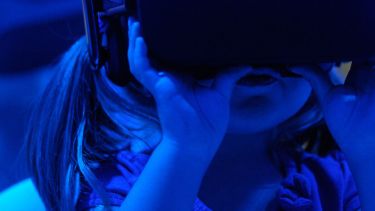Storyland
The aim of the ‘Storyland’ project is to understand how children can use virtual reality headsets for storytelling, to help develop an interactive VR storytelling game for children.

Aims
‘Storyland’ will develop a beta version of a virtual reality storytelling game targeted at children aged 8 to 12.
Cooperative Innovations (CI) is a games studio that specialises in VR and augmented reality (AR) experiences. This project particularly builds on Dr Becky Parry’s research on children’s media and children’s storytelling, digital and media literacies, and digital childhoods, and on Dr Aneesh Barai’s research on children’s media and media adaptations of children’s stories.
Later stages of the project also included work by students at the University of Sheffield on the MA in Digital Literacies, Culture and Education – Stephanie Ray and Ting Han – working with Cooperative Innovations for their dissertations. The work for this project was funded by XR Stories.
The main goal of ‘Storyland’ project was to help support younger children engage in creative and productive ways with virtual reality, since it is usually targeted at children aged 13 and over. Would children aged 8 to 12 find VR interesting? What would they enjoy doing in virtual spaces? What kinds of stories would they like to tell, and what kind of agency would they like to have in a virtual world?
The project began during the Covid-19 lockdowns, from October 2020 to December 2021, and was all undertaken remotely. We sent headsets to the participants’ houses, and the children, plus their families, had the chance to explore and play with virtual reality over a year-long period.
This enabled us to find out in greater depth not about just the novelty of VR for children, but whether and how it kept their interest over time. To do this, we held online focus groups with the children (supported by their parents and guardians for the technology), did online surveys, played Cooperative Innovations’ earlier VR game Spaceteam with the participants, and recorded the virtual stories that the children created.
Cooperative Innovations listened to the interests of the children from the early discussions and put together a concept for a storytelling game, which the children gave their feedback to. From that process, CI made the storyland beta version, which the children tried out and responded to.
Emma Cooper, immersive business development lead at Cooperative Innovations, said:
“The findings from this project are both timely and important, as virtual reality continues to increase in popularity across all age groups and within family groups, and its suitability for younger audiences is re-examined. In many ways virtual reality and kids is the perfect combination: VR can be such a playful and creative space and children just get it in a way that some adults struggle with. We are in no doubt that the project has helped Cooperative Innovations understand younger audiences better and make new products and experiences that the whole family will love.”
A further key aspect of the project was to critically reflect on how the game could be designed to be accessible and inclusive, which drew on Aneesh’s expertise in diversities of childhood.
Aneesh will continue further research on this project after ‘Storyland’, with a HEIF-funded project on gender, diversity and computer game avatar design, working with curators from the National Videogame Museum and with the experts in gender diversity, Andro & Eve.
More information about the ‘Storyland’ project


